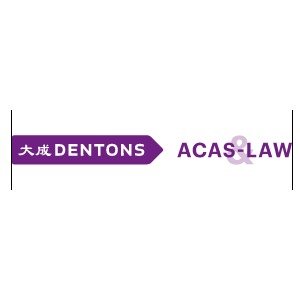Best Job Discrimination Lawyers in Nigeria
Share your needs with us, get contacted by law firms.
Free. Takes 2 min.
Or refine your search by selecting a city:
List of the best lawyers in Nigeria
About Job Discrimination Law in Nigeria
Job discrimination in Nigeria involves the unfair treatment of employees or job applicants based on specific attributes such as race, gender, disability, religion, or other protected characteristics. The Nigerian constitution, alongside specific laws and international conventions, provides the framework to combat workplace discrimination and promote equal opportunities. Discrimination in employment can manifest in various forms, including hiring practices, promotions, working conditions, and termination of employment. It is crucial for both employers and employees to be aware of these laws to foster a fair and inclusive work environment.
Why You May Need a Lawyer
Job discrimination can be complex and challenging to prove. Here are common situations where legal help might be necessary:
- Unfair Treatment: If you believe you are being treated unfairly because of personal attributes such as race, gender, or religion, a lawyer can help establish a case for discrimination.
- Improper Termination: If you were terminated under circumstances that suggest discrimination, legal assistance can be crucial in contesting your dismissal.
- Retaliation: If you've faced negative actions for reporting discrimination or assisting in discrimination claims, a lawyer can help protect your rights.
- Disability and Reasonable Accommodation: If your employer fails to provide reasonable adjustments for disabilities, legal advice may be warranted.
- Equal Pay Issues: Lawyers can help assess whether you are unfairly compensated compared to peers in similar roles.
Local Laws Overview
Nigeria's legal framework includes several important statutes and conventions aimed at eliminating job discrimination:
- The 1999 Constitution of Nigeria, especially Chapter IV, emphasizes the right to freedom from discrimination.
- The Labour Act provides general guidance on employment but lacks specific provisions on discrimination.
- The Employee’s Compensation Act guards against discrimination in compensation related to workplace injuries.
- The National Industrial Court serves as a forum for resolving employment disputes, including discrimination claims.
- The International Labour Organization (ILO) conventions, ratified by Nigeria, commit to eliminating discrimination in employment.
Frequently Asked Questions
What constitutes job discrimination under Nigerian law?
Job discrimination involves any discriminatory practice based on protected characteristics like race, sex, age, or marital status, which adversely affects employment decisions or conditions.
How can I prove job discrimination in Nigeria?
Proof typically involves demonstrating differential treatment in similar circumstances. Documentation, witness testimony, and statistical evidence can strengthen your case.
Is gender discrimination recognized in Nigerian employment law?
Yes, gender discrimination is recognized, and the Nigerian constitution prohibits discrimination based on sex, supporting equal treatment in employment.
What role does the National Industrial Court play regarding job discrimination?
The National Industrial Court has jurisdiction over labor disputes, including those involving job discrimination, and can provide remediation through legal rulings.
Are there specific laws addressing disability discrimination at work in Nigeria?
While Nigeria's disability-focused legislation is limited, the Discrimination Against Persons with Disabilities (Prohibition) Act provides some protection in employment contexts.
Can I report job discrimination directly to government authorities?
Yes, you can report to agencies like the National Human Rights Commission or seek redress through the National Industrial Court.
Does the Nigerian Employment Law protect against age discrimination?
Age discrimination is not explicitly covered, but general principles against discrimination might afford some protection.
What is the process for filing a discrimination claim in Nigeria?
Victims can lodge complaints with their employers, seek mediation, or file a lawsuit in the National Industrial Court for claims settlement.
Can workplace policies that disadvantage certain groups be challenged legally?
Yes, policies that result in indirect discrimination can be challenged if they disproportionately impact a protected group without a reasonable justification.
What should I do if I face retaliation after reporting discrimination?
Consult with a lawyer to discuss potential claims for retaliation and seek remedies through legal routes or internal company procedures.
Additional Resources
Consider reaching out to these organizations for further guidance or support:
- National Human Rights Commission - Offers support and can investigate discrimination claims.
- Legal Aid Council of Nigeria - Provides free legal advice and representation, helping individuals without the means to hire a lawyer.
- ILO Nigeria Office - Provides information and support concerning international labor rights.
- FIDA Nigeria - Focuses on legal rights advocacy, particularly for women, which includes gender-based discrimination cases.
Next Steps
If you believe you are facing job discrimination, consider taking the following steps:
- Document Your Case: Keep records of incidents, communications, and any evidence of discrimination.
- Consult a Lawyer: Seek expert advice to understand your legal options and build a strong case.
- Engage with HR: Use internal complaint mechanisms where possible, documenting each step.
- File a Claim: If internal methods fail, you can file a claim with the appropriate court or authority.
- Seek Support: Reach out to the recommended resources for guidance and possible representation.
Understanding your rights and available remedies is crucial in addressing job discrimination effectively and justly in Nigeria.
Lawzana helps you find the best lawyers and law firms in Nigeria through a curated and pre-screened list of qualified legal professionals. Our platform offers rankings and detailed profiles of attorneys and law firms, allowing you to compare based on practice areas, including Job Discrimination, experience, and client feedback.
Each profile includes a description of the firm's areas of practice, client reviews, team members and partners, year of establishment, spoken languages, office locations, contact information, social media presence, and any published articles or resources. Most firms on our platform speak English and are experienced in both local and international legal matters.
Get a quote from top-rated law firms in Nigeria — quickly, securely, and without unnecessary hassle.
Disclaimer:
The information provided on this page is for general informational purposes only and does not constitute legal advice. While we strive to ensure the accuracy and relevance of the content, legal information may change over time, and interpretations of the law can vary. You should always consult with a qualified legal professional for advice specific to your situation.
We disclaim all liability for actions taken or not taken based on the content of this page. If you believe any information is incorrect or outdated, please contact us, and we will review and update it where appropriate.
Browse job discrimination law firms by city in Nigeria
Refine your search by selecting a city.

















